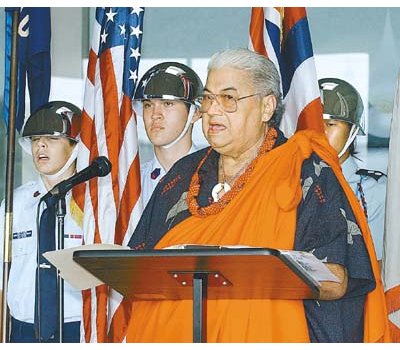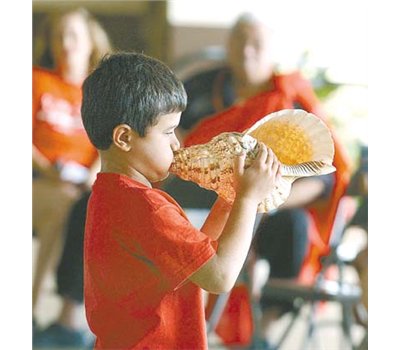In 2005 'we are strangers in our own land'
The Maui News
Saturday, August 20, 2005

By VALERIE MONSON, Staff Writer
WAILUKU - With the Hawaiian flag flying upside down in a show of distress as the rains fell, the so-called "celebration" of 46 years of statehood for the islands on Friday was more of a somber gray than red, white and blue.
"For me, I love America, and I love Hawaii," said Sidney Piosalan, a veteran of the first Gulf War, who served as master of ceremonies and unexpectedly found himself on the verge of breaking down. "My family comes from here. But when I was on a (military) ship, I felt hurt because my ship shot at Kahoolawe."
It was those mixed emotions, made even more intense by the recent federal court ruling against Kamehameha Schools' admissions policy, that had the sparse crowd on the lanai of the War Memorial Complex less than exuberant about commemorating the day that Hawaii was admitted as the 50th state in 1959. There almost seemed to be more voices singing "Hawaii Pono'i," the national anthem for the Hawaiian kingdom before its overthrow in 1893, than for "The Star Spangled Banner."
No matter what the feelings about the political climate, however, there was unanimous reverence and words of tribute for the veterans who have served or are serving the United States in the name of freedom.
Noah Leong, a World War II veteran, came forward to drape a black sleeve over an empty chair to honor those taken prisoner or still missing in action. After he placed a gold lei on the top of the chair, Leong took a step back and offered a salute.
The sometimes forgotten liberties that come with freedom were underlined by Piosalan.
"Because of the sacrifices of these men and women, you can say we live freely, with freedom to the point that the upside-down flag of Hawaii, which was the flag of the kingdom as well as the state, symbolizes a 'nation in distress,' " he said. With Native Hawaiian cultural specialist Charles Kauluwehi Maxwell Sr. tapped to give the keynote address, no one anticipated a flowery speech filled with the advantages of being part of America. Cloaked in a red kihei, Maxwell recalled the day when he heard the news that the territory of Hawaii was now a state.
"My father broke down in tears and said, 'We have lost Hawaii forever as we know it, and it will never be the same,' " said Maxwell.
He then began to recite a list of some of the changes that have taken place since statehood opened the doors to tourism and a boom of transplants from the Mainland: less ocean and mountain access; million-dollar homes in gated communities where Hawaiians used to fish and camp; more traffic; big box stores replacing mom-and-pop businesses; and wealthy gentlemen farmers buying up former sugar cane lands.
"Today in 2005, my father's words ring loudly," said Maxwell. "We are strangers in our own land."

One thing about Hawaii still rings true: the love for music. Even when Piosalan and others were still setting up, Maxwell and members of his family along with others joined in with the sweet ukulele and harmonies of Annie Alves and Richard Ho'opi'i. The music continued during the hour-long event as a bittersweet reminder of the beauty of the islands that remains.
Oddly enough, no elected officials, either from the county or state, were on hand. Piosalan said the ceremony was organized in the last couple of weeks by the Gulf War Veterans and the American Legion. By that time, most leaders who had been contacted already had plans.
Afterwards, Piosalan was asked why Maxwell, long on the front lines for Hawaiian rights, was selected as the main speaker.
"He told me how his father felt bad when Hawaii became a state, and I remembered how bad I felt when I was on that ship and we shot at Kahoolawe," he said. "I'm torn between both (feelings for America and Hawaii). That's how I'm connected to Charlie. I believe in America, it's the greatest country, but there are issues with statehood."
Maxwell said the United States needs to not only acknowledge the overthrow of the Hawaiian kingdom, but to make restitution and recognize a sovereign Hawaiian nation.
"If we are to be loyal patriotic Americans, then we have to be recognized as the kanaka maoli of this land, and America must give back what was stolen," he said. "We will not go away. This land is ours and our kupuna are crying for justice from this great nation that is big on promises but empty in actions."
Outside the complex, as heavy rains fell, both flags – the American flag attached right-side up to the pole just above the upside-down Hawaiian flag – hung in wet folds as another year of statehood began.
Copyright © 2005 The Maui News.